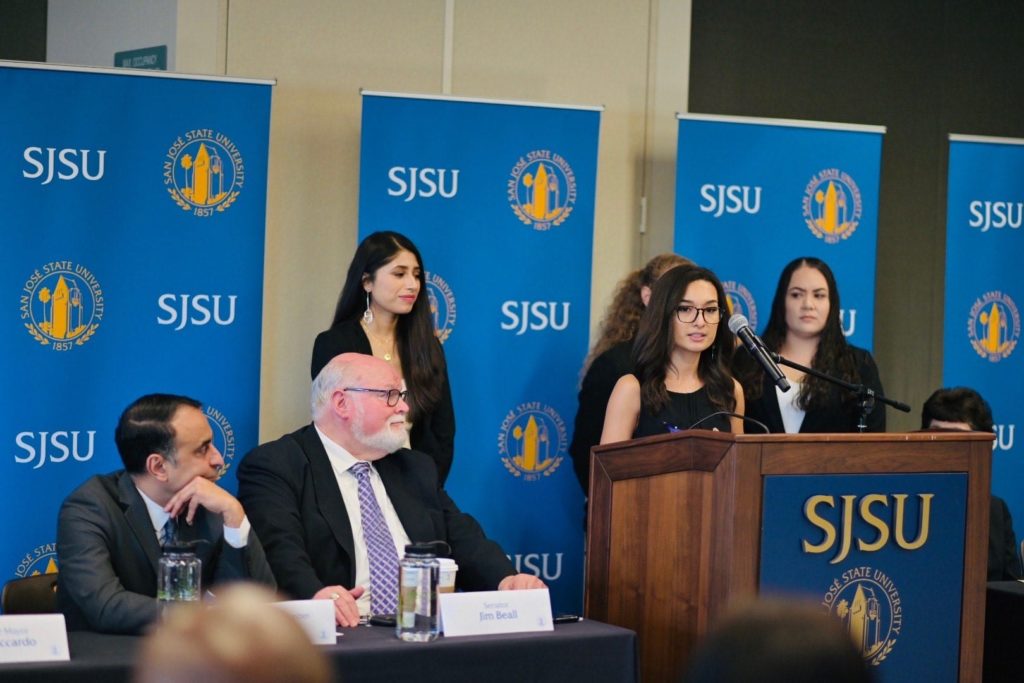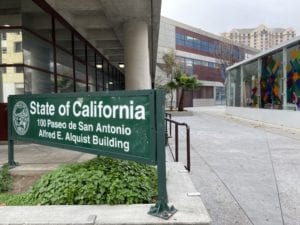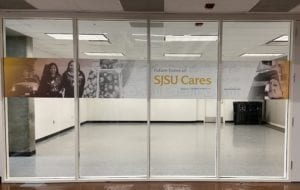San Jose State University leaders, along with state and local officials, have announced a suit of new initiatives to address homelessness and housing issues at the university, including a slew of grants to help with near-term needs and a plan to redevelop a nearby state office building site into 800 to 1200 new homes.
“Our need for more housing reminds us that students are just like the rest of us,” SJSU President Mary Papazian said Monday. “They concern themselves first with their basic needs and only when those are met can they pursue any higher needs like their studies and education … Well, help is around the corner.”
The Alquist Building, at 100 Paseo De San Antonio, has been at the heart of local discussions between the university and the state about surplus land that could be used for much-needed affordable housing. The building today is considered “obsolete” by the state, because it is deteriorating and has unused space throughout the building’s footprint.

Monday’s announcement comes after Sen. Jim Beall and Assemblyman Ash Kalra last year secured $250,000 in state funding to help the university create a new development plan for the property, which is expected to be demolished to make way for homes for SJSU faculty, staff, graduate students and students with families, along with other commercial uses, like retail or office.
Most of the homes would be available at rates below-market value when it opens, likely by 2025. Papazian said the development would be good not just for students, but to retain staff and faculty at the university.
“We’ve been making a case for some time and … finally the state has agreed to let San Jose State make a new plan for this building,” Beall said Monday. “As the project is planned, it will emphasize affordable housing, and we’re committed to making it a real opportunity, not just the highest paid faculty, but for staff and graduate students and other students to live near the campus.”

The university is also working on a third campus village on site, which will focus on providing homes for undergraduate and transfer students and offer limited per-night commuter housing alongside a new dining complex.
In addition to the long-term plan for new developments that are expected to rise in the coming years, SJSU has secured a trio of grants to address short-term housing needs for students.
Among them: an annual $870,000 grant for a rapid re-housing program that will last for three years, a grant to address students’ basic needs and a grant specifically to address mental health. In all, the grants come to $2.265 million for the next 18 months and will grow to $3.135 million in 2022.
“I taught here for a couple of years and understood how many of my students depended on more than one job just to be able to get through,” San Jose Mayor Sam Liccardo said. “With all the challenges they have, the last thing they need to be thinking about is whether they’re going to sleep at night.”
Meanwhile, university leaders have agreed to expand or launch services for students who are in need of housing based on conversations and collaboration with the Student Homeless Alliance and Associated Students, two on-campus groups which for years have been advocating for the university to expand its services for housing insecure students.
Recent data shows that more than 13.2 percent of SJSU students experienced homelessness in the 2016-2017 school year, a number that equates to more than 4,000 students. That figure is more than two points higher than the CSU system average of 10.9 percent, and has propelled vocal calls from the student groups to make homelessness a bigger priority at SJSU.
But up until Monday, many of their demands went unmet.

University leaders have now announced that in the fall, SJSU will address many of the student’s demands, including launching a pilot program to set aside at least a dozen beds for emergency housing — an initiative school leaders anticipate will offer a better idea of the true need for such a program — and will open a dedicated SJSU Cares space on campus in Clark Hall.
That space will also include a satellite office of the Bill Wilson Center, a nonprofit that focuses on helping youth and families in need of housing, education and counseling.
“The programs announced today may have been created at some point in the future, but it is happening now because of us, the students,” said Briena Brown, vice president of the Student Homeless Alliance. “In the coming months, SHA will be working on a statewide solution to this housing crisis, but today we are grateful that SJSU has taken a major step towards meeting the basic needs of our students.”
SJSU’s gain comes as California works to identify state-owned surplus land where housing can be built, after recent state data suggested around 150,000 residents are unhoused in California and the Santa Clara County Homeless Census and Survey showed 9,700 people were homeless in 2019.
The announcement comes after the university, the Bill Wilson Center and Airbnb in November, partnered to connect homeless SJSU students with temporary housing via the hospitality and home-sharing application using a state grant to pay lodging costs.
But the Airbnb partnership is a temporary solution, while the proposed housing at the Alquist building site and other initiatives announced Monday could offer a more long-term, stable solution for employees and students alike.
“All of San Jose, all of Silicon Valley is struggling,” Kalra said Monday. “And San Jose State University, not only are they not immune to the housing crisis, they’re especially vulnerable to the housing crisis, both the faculty staff and especially students. So seeing everyone come together to figure this vexing problem out is critically important.”
Contact Janice Bitters at [email protected] or follow @JaniceBitters on Twitter.



Leave a Reply
You must be logged in to post a comment.